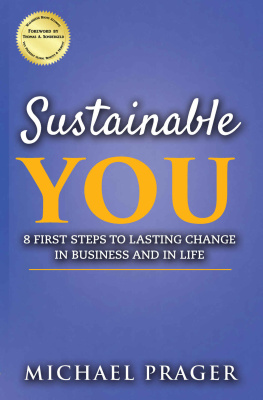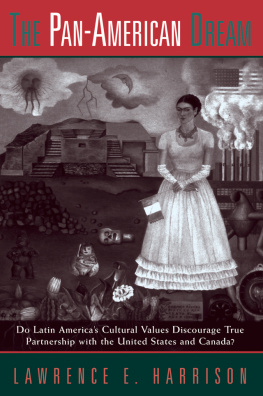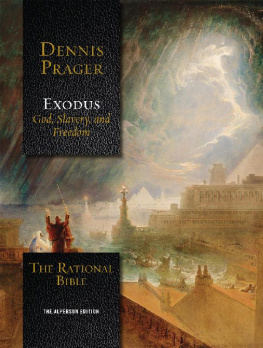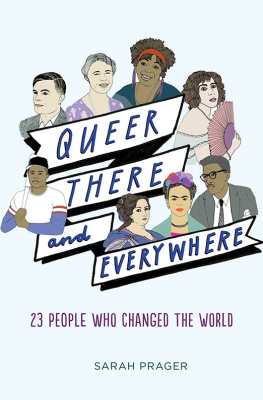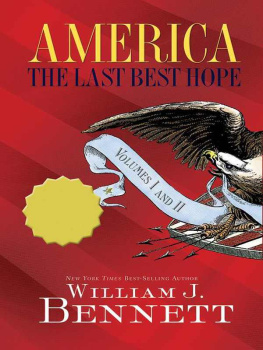Why This Book
I HAVE WRITTEN THIS BOOK because I am convinced that there is a way to end most evil. And ending evil is the most important task humans can ever undertake.
The only proven way to achieve this on any large scale is the American value system. These values are proclaimed on every American coin: Liberty, In God We Trust, E Pluribus Unum. Each one is explained at length, and each one is adaptable to just about any society in the world.
I have written this book with a number of audiences in mind:
It is written first for Americans who already affirm American values. To those who would argue that this is an unnecessary exercise in preaching to the choir, I would say that, unfortunately, this is not the case. Most of the choir have forgotten the melody. Few Americans can articulate what is distinctive about American values, or even what they are.
There is, in fact, a thirst among Americans for rediscovering and reaffirming American values. I know this from my daily radio show, and I know this from a personal experience. A few years ago, at a public forum at the University of Denver, I was asked by the moderator, former Colorado senator Bill Armstrong, what I thought the greatest problem confronting America was. I answered that it was that the last two generations of Americans have not communicated what it means to be American to their children. Someone in the audience videotaped my response and put it on YouTube, where millions of people have seen it. A lot of Americans realize we have forgotten what we stand for.
The second audience consists of thoseAmericans and all otherswho either do not believe that the American value system is as described, or that it is the best ever devised, or that there is even such a thing as a specifically American value system. I welcome these readers. I have in many ways designed this book for them.
The third audience is non-Americans. As this book goes to press, it is finally becoming obvious that the European attempt to create a welfare state alternative to the American model has failed. Begun after World War II, the secular welfare state offered Europeans and sympathetic non-Europeans an alternative to American religiosity and to what the welfare states supporters depict as cutthroat, heartless American free market capitalism. But some fifty to sixty years later, it is clear that this state is economicallyand, as I show in the book, morallyunsustainable. Of the two democratic modelsthe European and the Americanonly the American one works and can endure. And the beauty of it as far as non-Americans are concerned is that it does not demand that any group give up its national or religious culture (except insofar as the culture holds values in conflict with the American value system). On the contrary, Americanism, as this value system is called, wants all peoples to retain their national culture and allegiances.
A word about the way arguments are formulated here: I make a generalization and then support it with one or more examples. To those readers who object to generalizations, I respond: First, there is no wisdom without generalizations. Generalizations are what enable us to make sense of the world. If one cannot generalize, one cannot see patterns, and therefore one cannot make sense of reality. Seat belts save lives is a generalization. Now, everyone knows that sometimes seat belts actually cause the death of a driver or passenger. Does that invalidate the generalization? Of course not. The existence of exceptions does not invalidate a generalization. Moreover, if we could not make this particular generalization, many people would die needlessly. Therefore, the objection to a person making a generalization cannot be Youre generalizing, as if doing so is inherently wrong. The only valid objection to a generalization is Your generalization is untrue. For that reason I always offer examples to illustrate the generalization.
One major goal of this book is to present as thorough a dissection of Leftism as has been written. There are many brilliant works on aspects of the Leftand I have greatly benefitted from many of them. But what we need mostand if I did not believe this was needed, I would not have devoted so much time to writing this bookis an overall explanation of the inherent moral and intellectual defects of Leftism, along with an explanation of why so many people believe in it despite its terrible track record. Still the Best Hope is the product of a lifetimes thought and study. I began formal study of the Left while in graduate school at the Russian Institute of Columbia Universitys School of International Affairs and have never stopped.
As I repeatedly make clear, I almost never judge the motives or the character of people with Left-wing views. I do not for many reasons, but chief among them is that I know personally many peoplein my extended family and among friends and acquaintanceswho hold those views, and whom I adore. The family is a great institution for many obvious reasons. Here is a less obvious one: It teaches us how to love people with whom we may have major disagreements. Its easy to love friendswe choose them. Its not always as easy to love family members with whom one strongly differs on some of the most important issues of life.
One of the worst features of the Left is its assumption that those on the Right are bad people. It is not a view I reciprocate. Indeed, my understanding that so many people with Left-wing views mean well is what enables me to analyze the Left as thoroughly as I do. After all, if everyone you differ with is bad, there is nothing to analyze. You just label them bad and move on.
While on the subject of Leftism, two other issues need to be addressed.
One is the use of the words liberal and Leftthey are used more or less interchangeably. The reason is implicitly explained, but I need to address it explicitly. There was a difference between liberals and the Left for many decades. In the United States, the distinction ended after the Vietnam War. The John F. Kennedytype liberalanti-Communist, in favor of using American power to spread liberty, and for lower taxes to stimulate economic growthessentially died with his assassination on November 22, 1963.
When the New York Times began identifying the Nation , among the most Left-wing journals published in America, as liberal, that exemplified the Left-wing takeover of the term liberal. Many people who hold Left-wing views still prefer to call themselves liberal, but their views are indeed Left-wing. They simply prefer the term liberal because they do not wish to see themselves, or have others see them as, Leftists. If the New York Times editorial page is liberal, what is Left? I cannot come up with one major difference between the Nation and the New York Times editorial page.
This in turn leads to the other issue that needs to be clarified. I am sure that many readers, upon encountering a Left-wing position, will say to themselves, or perhaps yell to anyone within hearing distance, Im a liberal [or on the Left] but I dont hold that viewwhats this guy talking about?
My response is that in this book I have no interest in identifying Leftist individuals. I am interested in identifying Leftist positions. The fact that any given liberal or Leftist does not hold a certain view does not mean the view is not Leftist. For example, opposition to the death penalty for murder is a Left-wing position despite the fact that some people who call themselves liberal or Left are in favor of the death penalty. It is my belief, in any event, that many Americans who call themselves liberal actually hold many conservative positions. But thanks to the brilliantly successful, nearly century-long campaign to demonize the Right and identify liberal with compassion, decency, fairness, and social justice, these people would never allow themselves to identify as conservative, let alone to vote Republican.


